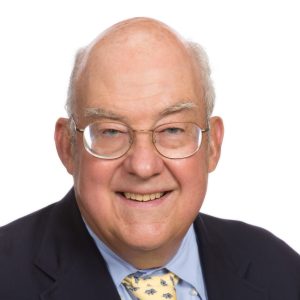Editor’s Note: In this BC Law Magazine “Vision Project” series, we are engaged in a lengthy discussion with Boston College Law School faculty about where the Covid-19 pandemic and its attendant medical, economic, racial, and political consequences may lead us. As New York Times op-ed columnist Timothy Egan so eloquently put it recently, “Every crisis opens a course to the unknown. In an eye-blink, the impossible becomes possible. History in a sprint can mean a dark, lasting turn for the worse, or a new day of enlightened public policy.” There are warnings and worries in these professors’ views, but there are also farsighted ideas and strategies for crafting a better future, a more just society, and a world in which each and every human being is equal under the law.
PROFESSOR DANIEL COQUILLETTE
The J. Donald Monan, SJ, University Professor at Boston College, Coquillette teaches and writes in the areas of legal history and professional responsibility. He is a former dean of BC Law and the co-author, with Bruce Kimball, of the two-volume On the Battlefield of Merit: Harvard Law School, the First Century and The Intellectual Sword: Harvard Law School, the Second Century.

In historical terms, what have the coronavirus pandemic and the recent uprising against racism revealed about the strengths and weaknesses of the rule of law and its responsiveness in times of crisis? Students in our legal history courses learn that the underpinnings of our legal order are not rules or police forces, but the cultural heritage that binds us as people, a heritage that permeates our Constitution, but predates it by centuries. We have seen wars, natural disasters, and civil unrest. These cannot threaten us if we remain, in the words of Dr. Martin Luther King Jr., loyal to “those deep wells of democracy which are dug deep by the founding fathers.”
Recently, I have been working with US Judicial Conference committees trying to protect fundamental rights where every jury trial and sentencing is problematic. We will succeed, because of the commitment of our independent judiciary and bar to these values. To modify a well-known phrase by former Wyoming Senator Alan Simpson, “If we protect these values, nothing else matters. If we do not protect them, nothing else matters.”
I should note that most of my answers here were written before the horrific slaying of George Floyd and the huge reaction against racism that has swept this country. I am particularly proud of Boston College Law School’s immediate mobilization, under the inspired leadership of Dean Rougeau, through the BC Forum on Racial Justice in America. But we have a lot to do as a nation. The virus may be a historic challenge, but American racism is a far more dangerous one.
What short- and long-term opportunities do you see arising from the pandemic and systemic racism for a new understanding of and appreciation for the lessons of legal history? The virus, like wars and natural disasters, endangers us all. Of course, the impact has been felt very disproportionately by the poor and socially marginalized, but there is no scientific solution to the pandemic that does not include everybody. An attitude of “I have mine, Jack” has never built strong societies, and will not get us through even the next six months. When Hurricane Irene devastated Vermont in 2011, cutting off whole towns and villages, leaving thousands with no food, drinking water, or even dry clothes, Vermonters met the challenge as one people. Outside the little general stores there were erected two notice boards entitled “I Need” and “I Have” with resources constantly moving from the “Have” board to the “Need” board.
Our legal system cannot survive by force alone, and every well-educated lawyer knows that we have a social contract based, not on the interests of any particular group, but on the general welfare. If we learn from this pandemic to reassert the basic American values of compassion and care for all, we will emerge, like Vermont did from Irene, a stronger place.
And now we must confront again an even more dangerous pandemic, racism. To compassion and empathy, we must add courage and determination. Dr. King, who gave his life in this cause, shows the way.
What is your vision for a post-pandemic world: What resources can you point to that could guide us toward building and sustaining a stronger and more just society? My father used to tell me, “Dan, institutions people love are amazingly tough!” I think of this frequently today, considering all the challenges facing this Law School and University in the months ahead. But this school, and those like it, are where the resources exist to build a post-pandemic world.
With Bruce Kimball, I have just completed a two-volume Bicentennial History of Harvard Law School, a school that was brutally divided by Civil War, was essentially shut down by two World Wars, and then by rioting in 1971. I feel particular sympathy for the cost paid by our students, as I was a law student when our semester was cut off by rioting. It was bad.
Boston College was founded in the middle of the Civil War, and BC Law at the outset of the Great Depression. But these schools have not only survived, they have been the sources of social recovery. Recently, Harvard University President Lawrence Bacow wrote a letter to the academic community in which he said, “I believe in the power of knowledge and ideas to change the world, of science and medicine to defeat disease, of the artisans humanities to illuminate the human condition.”
BC Law is very tough, partly because of the students, alumni, faculty, and staff who love it, but most especially because it represents the hope for a better future and the resources to make it happen.
Read all faculty Vision Project interviews here.

